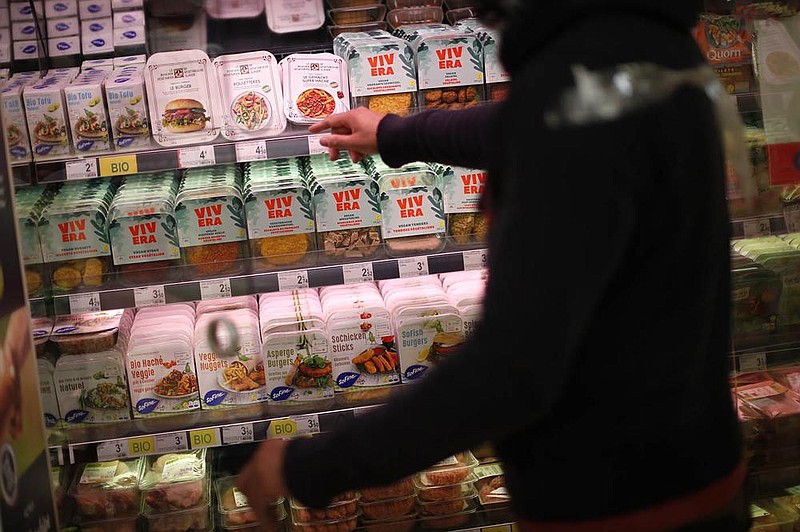BRUSSELS -- It's a meaty issue, but the European Union has taken a stance: Veggie burgers are in fact burgers.
European lawmakers said Friday that plant-based products that do not contain meat, including veggie burgers, soy steaks and vegan sausages, can continue to be sold as such in restaurants and shops across the European Union's 27 countries.
Europe's largest farmers' association had supported a ban, arguing that labelling vegetarian substitutes with designations bringing meat to mind was misleading for consumers.
Brussels-based Copa-Cogeca, a union of two European agricultural umbrella organizations, launched a campaign called "ceci n'est pas un steak" (this is not a steak) in protest of what it called "cultural hijacking" that it said hurt hard-working farmers.
"We simply call for the work of millions of European farmers and livestock sector workers to be acknowledged and respected," Jean-Pierre Fleury, the group's chairman, said in a statement this month.
A proposal to expand a ban on descriptions such as "yogurt-style" or "cream imitation" for nondairy replacements did pass, extending limitations on the use of words like "milk" and "butter" on nondairy alternatives.
European environmentalists pushed back against the "burger" ban, arguing that using terms such as veggie "discs" or "fingers" could deter consumers looking to reduce their meat consumption.
A group of 13 organizations including Greenpeace and the World Wildlife Fund urged the European Parliament to reject the proposed amendments, saying a shift toward more plant-based diet is in line with the EU Commission's ambition to tackle global warming. Losing the ability to use the terms steak or sausage might make those plant-based products more obscure for consumers.
"Consumers are in no way confused by a soy steak or chickpea-based sausage, so long as it is clearly labeled as vegetarian or vegan," Camille Perrin, senior food policy officer at the Brussels-based European Consumer Organization, said in a statement. "Terms such as 'burger' or 'steak' on plant-based items simply make it much easier for consumers to know how to integrate these products within a meal."
Jasmijn de Boo, vice president of ProVeg International, a group aimed at reducing meat consumption, said the proposal was not in the interest of consumers or manufacturers, and that shoppers were not confused by the labels currently on store shelves.
"Why change something to a 'veggie disc' or 'tube' instead of a sausage?" she said. "It's ridiculous."
And shoppers seem to like the names. In a survey this year from the European Consumer Organization, about 42% of respondents said they believed "meaty" names for plant-based products should be permitted if products were clearly labeled vegetarian or vegan. Twenty-five percent said such names should be banned.
A spokesman for Copa-Cogeca said the organization did not believe that shoppers are unable tell the difference between meat and plant-based products, and said farmers were not against vegetable alternatives. But he said that differentiating the markets -- much like those of butter and margarine -- was among a host of initiatives that would support farmers trying to adapt to a world more focused on sustainability.
ING Think, a global research firm, published a report Thursday estimating that sales of meat and dairy alternatives in Europe grew by nearly 10% over the past decade. The study estimated the market's share would rise to $8.8 billion by 2025, up from $5.2 billion in 2019.
"The sheer size of the meat and dairy market and the small base for plant-based alternatives mean that, even at the current growth rate, it would take until the mid-2050s before sales of 'plant-based meat and dairy' could surpass sales of meat and dairy," the report concluded.
Some said the proposal would provide more fodder for what critics call the European Union's penchant for overregulation. Alexander Stubb, a former prime minister of Finland, said the bloc should legislate only "where there are impediments to the free movement of goods, services, money and people."
He described the amendment as "overkill" that would bolster the arguments of those who campaigned for Britain's exit from the bloc: "This is one of these symbolic sad cases -- a bit like legislating on the curve of cucumbers."
Information for this article was contributed by staff members of The Associated Press, by Miriam Berger and Michael Birnbaum of The Washington Post, and by Isabella Kwai of The New York Times.

